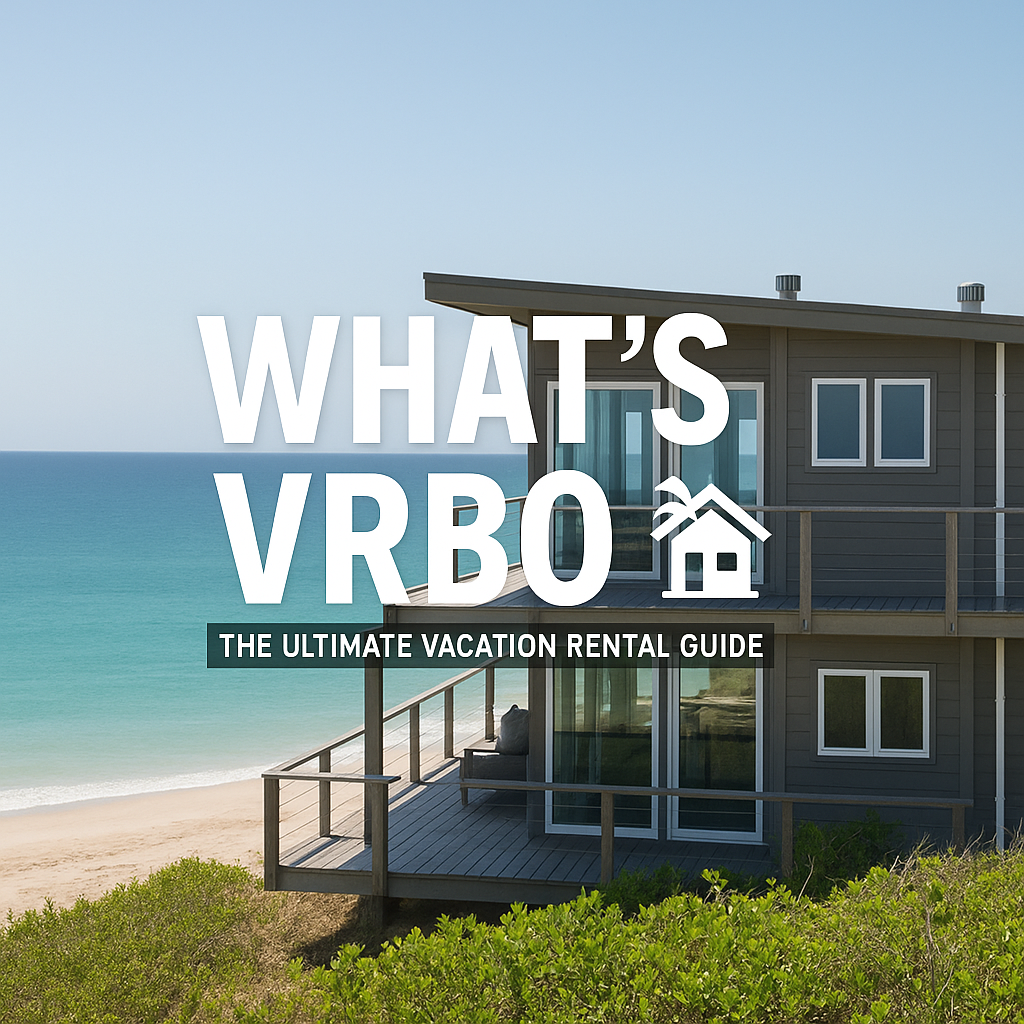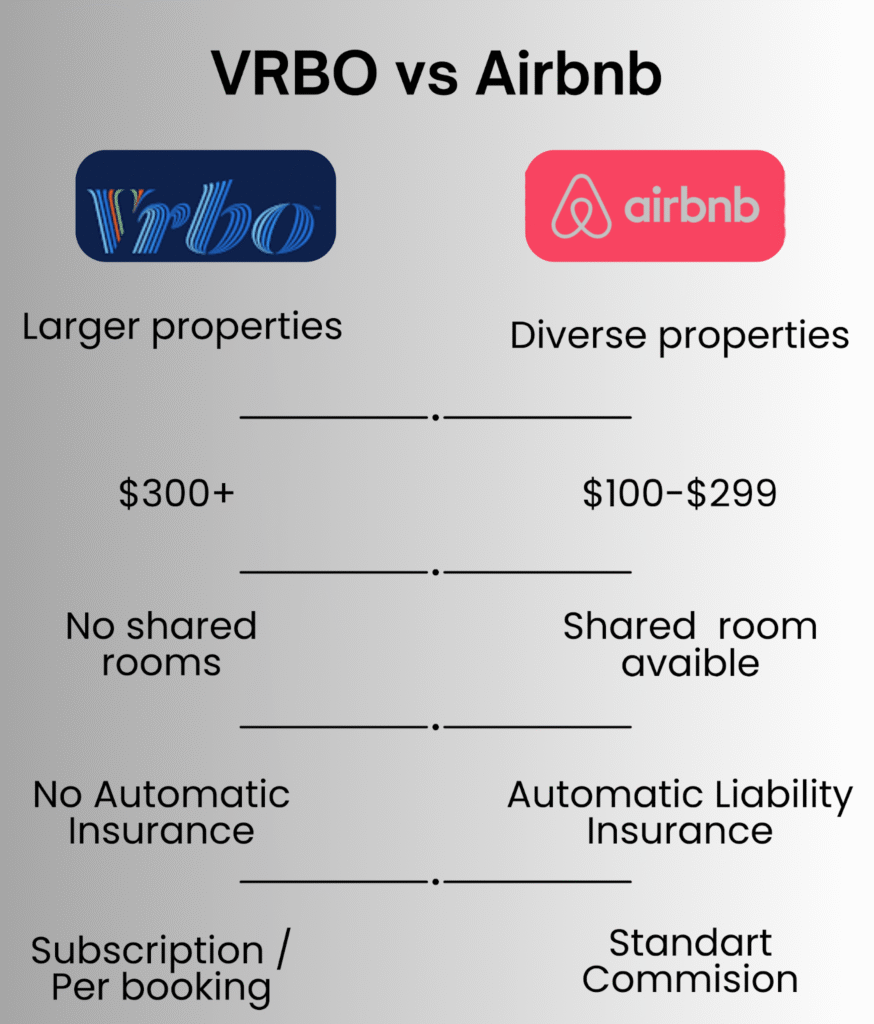Vrbo vs Airbnb (2026): Key Differences for Hosts

Vrbo is an American vacation rental online marketplace, originally known as Vacation Rentals by Owner. The portfolio is predominantly American and has a largely American guest base, yet it operates in 190 countries and features more than 2 million properties worldwide.
The site serves as a prominent online marketplace that links vacationers with a wide variety of rental properties, including houses, condos, and villas. In contrast to platforms that cater primarily to brief urban stays, Vrbo has historically prioritized entire home rentals that are ideal for families and larger groups looking for extended vacations.
While Airbnb and Vrbo are often grouped together, they serve different audiences, charge different fees, and reward different hosting strategies. In this guide, we compare Vrbo vs Airbnb in 2026 from a host’s perspective – covering fees, cancellation rules, guest demand, safety, payout structure, and booking behavior.
Vrbo vs Airbnb for Hosts
While the platforms may seem similar at first glance, there are critical differences in how each operates that can affect hosts’ earnings.

Key Takeaways / Why Should You List Your Property on VRBO?
- Open a VBRO account
- Verify your identity
- Create your listing by entering all the details about your property. Specify the property type and location, the number of bedrooms and bathrooms, and how many guests it can accommodate. Include amenities, a detailed description, house rules, and a cancellation policy. You may also attach a rental agreement if you wish.
- Include high-quality photos with descriptive captions.
- Adjust your calendar and prices
And you’re all set. You’re now a homeowner with a listing on Vrbo.
Common Mistakes When Hosting on VRBO?
Property Type Disputes
When describing your property, don’t list only common areas or private rooms. All amenities should be accessible to guests; otherwise, you may receive negative reviews or low ratings.

Photo quality issues
Avoid low-quality photos or photos that misrepresent your property. These photos can result in very low ratings.
Communication problems
If you respond late or incompletely to guests or guest candidates, you will receive low scores.
Seasonality Due to Predominantly Foreign Guests
The majority of Vrbo’s guest base comes from the U.S. and North America. If you’re hosting in Turkey and your city or region mainly attracts local or non-American travelers, you’re more likely to face low occupancy rates during the off-season.
Legal compliance deficiencies
You should thoroughly research the legal requirements in the area you’re renting in. Obtain all necessary permits and licenses before listing your property.
Pricing and fee transparency issues
Transparent pricing builds trust and reduces cancellations. Clearly state all costs upfront, including cleaning, pet, or other additional fees.
Conclusion: Should you host on VRBO
Vrbo is a rapidly growing platform focused on long-term vacation rentals, particularly in markets with high-capacity, standalone homes. By expanding to more platforms like Vrbo, you can increase your property’s visibility, attract new audiences, and ultimately drive more bookings and revenue.
If you own a large, detached vacation home, especially one suited for families or groups your property aligns perfectly with what Vrbo guests are looking for, so it’s definitely worth listing.
However, it’s important to note that Vrbo’s guest base is predominantly American, with around 74% of its customers coming from the U.S.. While Vrbo operates in over 190 countries, its strongest market and demand concentration remain in North America.
Therefore, if your property is outside the U.S. or not in a region that attracts primarily American travelers, it may not generate as many bookings. Still, listing on Vrbo can be a valuable addition to your multi-channel strategy enhancing your reach, diversifying your exposure, and increasing your overall reservation potential.
About Homesberg
Why bother with five different tools when one will suffice? Homesberg combines dynamic pricing, rank tracking, and channel management all under one roof.
Homesberg is an all-in-one vacation rental management platform built around the must-have features hosts actually need: self-sufficient market data collection, tracking your Airbnb rankings, a robust dynamic pricing engine, and seamless integrations with all major channels. No more juggling multiple tools or paying for underutilized features.
- Vrbo is one of the leading platforms for vacation homeowners to showcase their properties and maximize their rental income.
- It helps you reach more travelers and get more bookings.
- Increased visibility through Expedia integration.
- A well-established rental platform with a long-standing history.
- A rental site with a customer habit
Location
Vrbo properties are generally concentrated in coastal, mountain, and lakeside destinations. Unlike city-center apartments, listings on Vrbo tend to be larger, standalone vacation homes or villas. Designed for families or larger groups, these properties often feature spacious gardens, private pools, and amenities suited for longer stays. In contrast, Airbnb listings come in all sorts and mostly ideal for short-term stays.
Pricing
Prices on Vrbo are generally higher due to the location and size of the properties, averaging $300 or more per night. In contrast, Airbnb prices typically range between $100 and $299. This difference stems from Vrbo’s focus on larger, standalone vacation homes with higher guest capacity.
Rental housing type
Shared room rentals are not included on Vrbo.
Fees
Vrbo also differs from Airbnb in terms of pricing and property insurance. Its annual subscription model allows hosts to pay a one-time fee for all their listings; however, this option is no longer universally available.
According to Vrbo’s official help center, accounts that only have pay-per-booking (PPB) plans active are not eligible to purchase a subscription. Moreover, many recent guides indicate that new hosts or new listings can only use the pay-per-booking model, as the annual subscription option is being gradually phased out.
For instance, Lodgify notes that “only hosts with an existing active subscription can renew; new hosts must use pay-per-booking.” The subscription fee itself varies by source some list it as US $499, others as US $699 and processing fees of around 3% often still apply even under the subscription model. However, when opting for the per-stay commission system, these fees are typically higher than those on Airbnb.
How to Create a Listing on VRBO?
- Open a VBRO account
- Verify your identity
- Create your listing by entering all the details about your property. Specify the property type and location, the number of bedrooms and bathrooms, and how many guests it can accommodate. Include amenities, a detailed description, house rules, and a cancellation policy. You may also attach a rental agreement if you wish.
- Include high-quality photos with descriptive captions.
- Adjust your calendar and prices
And you’re all set. You’re now a homeowner with a listing on Vrbo.
Common Mistakes When Hosting on VRBO?
Property Type Disputes
When describing your property, don’t list only common areas or private rooms. All amenities should be accessible to guests; otherwise, you may receive negative reviews or low ratings.

Photo quality issues
Avoid low-quality photos or photos that misrepresent your property. These photos can result in very low ratings.
Communication problems
If you respond late or incompletely to guests or guest candidates, you will receive low scores.
Seasonality Due to Predominantly Foreign Guests
The majority of Vrbo’s guest base comes from the U.S. and North America. If you’re hosting in Turkey and your city or region mainly attracts local or non-American travelers, you’re more likely to face low occupancy rates during the off-season.
Legal compliance deficiencies
You should thoroughly research the legal requirements in the area you’re renting in. Obtain all necessary permits and licenses before listing your property.
Pricing and fee transparency issues
Transparent pricing builds trust and reduces cancellations. Clearly state all costs upfront, including cleaning, pet, or other additional fees.
Conclusion: Should you host on VRBO
Vrbo is a rapidly growing platform focused on long-term vacation rentals, particularly in markets with high-capacity, standalone homes. By expanding to more platforms like Vrbo, you can increase your property’s visibility, attract new audiences, and ultimately drive more bookings and revenue.
If you own a large, detached vacation home, especially one suited for families or groups your property aligns perfectly with what Vrbo guests are looking for, so it’s definitely worth listing.
However, it’s important to note that Vrbo’s guest base is predominantly American, with around 74% of its customers coming from the U.S.. While Vrbo operates in over 190 countries, its strongest market and demand concentration remain in North America.
Therefore, if your property is outside the U.S. or not in a region that attracts primarily American travelers, it may not generate as many bookings. Still, listing on Vrbo can be a valuable addition to your multi-channel strategy enhancing your reach, diversifying your exposure, and increasing your overall reservation potential.
About Homesberg
Why bother with five different tools when one will suffice? Homesberg combines dynamic pricing, rank tracking, and channel management all under one roof.
Homesberg is an all-in-one vacation rental management platform built around the must-have features hosts actually need: self-sufficient market data collection, tracking your Airbnb rankings, a robust dynamic pricing engine, and seamless integrations with all major channels. No more juggling multiple tools or paying for underutilized features.
